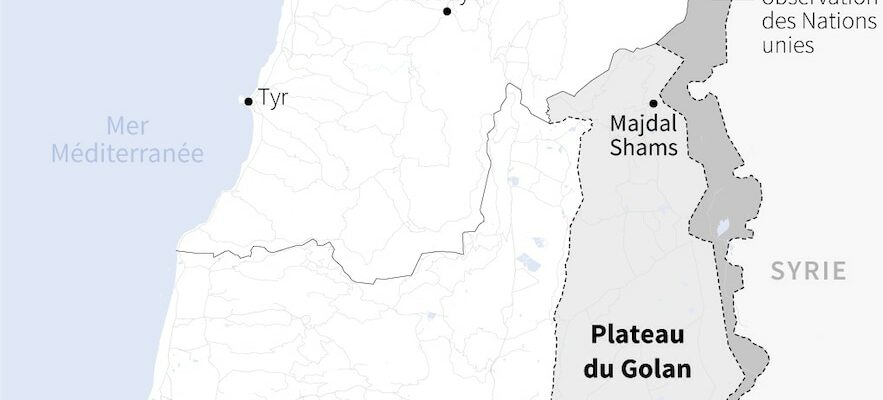The Israeli army carried out a strike on the southern suburbs of Beirut, a stronghold of the Lebanese Hezbollah, targeting a commander “responsible” for the deadly attack on the Golan Heights, which Israel had promised to retaliate against. “The Israeli army carried out a targeted attack in Beirut against the commander responsible for the murder of the children of Majdal Shams and many other Israeli civilians,” the army said in a statement, referring to the attack Saturday in this Druze city, in the part of the Syrian Golan Heights annexed by Israel, where 12 young people were killed. A source close to Hezbollah said that military leader Fouad Shokr escaped the Israeli strike.
This rocket attack on a football field was attributed by Israel, as well as by the United States, to the Lebanese Islamist movement, which denied it. A source close to Hezbollah reported an Israeli strike on the southern suburbs of Beirut, targeting a military leader of the Islamist movement. A few minutes after the strike, Israeli Defense Minister Yoav Gallant declared that Hezbollah had “crossed the red line”. Israeli Prime Minister Benjamin Netanyahu assured Monday that his country would provide a “severe response” to the attack.
This has revived fears of an extension to Lebanon of the war in Gaza between Israel and the Palestinian Hamas, an ally of Hezbollah, and of a generalized conflict in the region. An Israeli civilian was killed on Tuesday, July 30, by the fall of a rocket in the north of Israel, according to the rescue services, and the army affirmed to have responded to a barrage of rockets by firing towards Lebanon. It had announced earlier that it had struck “a dozen terrorist targets of Hezbollah” in “seven different zones” of the south of Lebanon, and killed a member of the armed movement.
In response to the strikes, which caused “significant damage” according to the Lebanese National News Agency (ANI), Hezbollah said it had launched several attacks, including two on the Beit Hillel barracks in northern Israel using Katyusha rockets and explosive drones. Since the start of the war in Gaza, triggered on October 7 by the unprecedented attack by Hamas on Israeli soil, exchanges of fire have been almost daily on Israel’s northern border with Lebanon, between the Israeli army and Hezbollah, an all-powerful movement in Lebanon, supported by Iran.
The border area between Lebanon and Israel and the Golan Heights
© / afp.com/Patricio ARANA, Sabrina BLANCHARD, Nalini LEPETIT-CHELLA
“Forbidden” Revenge
“These children are our children… The State of Israel will not, and cannot, let this go. Our response will come, and it will be severe,” Netanyahu said Monday, visiting Majdal Shams. Druze leaders in the town said after the visit that they rejected the idea of a response. “The tragedy is immense,” they said. But because of the Druze doctrine, whose religion is derived from Islam, which “forbids murder and revenge in any form, we reject shedding even a drop of blood under the pretext of avenging our children,” they added.
The International Committee of the Red Cross (ICRC) said on Tuesday that it was “deeply concerned about the growing threat of a generalized conflict throughout the region” and “urged all parties and the international community to work urgently to defuse tensions.” Several airlines have suspended flights to Beirut since Monday, including Air France, which has announced that it plans to resume services on Wednesday. The CEO of Middle East Airlines, Lebanon’s national airline, Mohammad al-Hout, assured that the airport “had not received any threats.” In Beirut, residents interviewed by AFP were worried about this outbreak of fever, while others seemed resigned.
“I live in constant worry. I think about how I could get my children to flee if war breaks out. This situation of waiting and instability is tiring,” said Cosette Bechara, a 40-year-old employee and mother of two. The international community is stepping up efforts to prevent the conflict from spreading. A French diplomat said in Beirut that France, “alongside other partners, notably the United States, is making all-out efforts to call on the parties to exercise restraint.”
Khan Younes withdrawal
Meanwhile, the war continues in the Gaza Strip. It broke out on October 7, when Hamas commandos carried out an attack in southern Israel that resulted in the death of 1,197 people, mostly civilians, according to an AFP count based on official Israeli data. Of the 251 people kidnapped at the time, 111 are still being held in Gaza, 39 of whom are dead, according to the army. In response, Israel has promised to destroy Hamas, which has been in power in the Palestinian territory since 2007, which it considers a terrorist organization, as do the United States and the European Union.
His army has launched an offensive that has so far killed 39,400 people, according to data from the Health Ministry of the Hamas-led Gaza government, which does not provide information on the number of civilians and fighters killed. On Tuesday, strikes and artillery fire were reported in Khan Younis and Rafah (south), on the al-Bureij camp (center), and in Gaza City (north). The Civil Defense announced that the Israeli military operation launched on July 22 in the Khan Younis governorate had killed around 300 people.
The army said it had completed the operation and killed “more than 150 terrorists.” AFP correspondents cited witnesses as saying tank fire targeted eastern Khan Younis early Tuesday. At least eight bodies were found in the area, rescuers and medics said.
